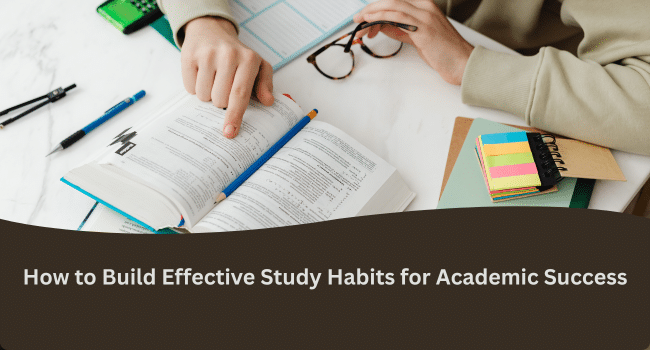Table of Contents
Academic success is not just about how intelligent a student is—it is more about how effectively they study. Good study habits can turn an average student into an excellent one and help high achievers stay on top of their performance. Whether you are in school, college, or pursuing a professional course, learning how to study smartly matters more than studying endlessly. Effective study habits reduce stress, save time, improve memory, and build confidence. Once you develop them, they become your lifelong assets, useful not only in academics but also in your career.
Some students struggle to stay disciplined, while others look for shortcuts like asking someone else to take my online class for me or searching for MyAssignmentHelp.com. But the truth is, shortcuts may offer temporary relief, yet they rarely lead to lasting success. The real goal shouldn’t be to avoid studying but to develop study habits that make learning manageable and rewarding.
Understand Your Learning Style
Every student learns differently. Some understand concepts better through visuals, like charts and diagrams; others prefer listening to lectures or discussion-based learning. There are also students who learn best through hands-on practice or writing notes again and again. Recognizing your learning style is the first step toward building effective study habits.
Ask yourself:
- Do I remember things better when I hear them?
- Do I need to write notes to make information stick?
- Do diagrams and colors help me?
Once you understand your learning style, you can adapt your study methods to suit it. This reduces study time and increases retention because you are learning in the most natural way for your brain.
Create a Study Schedule and Stick to It
Consistency beats last-minute cramming every single time. Students often wait until exams are near and then get trapped in stress and sleepless nights. A study schedule helps break the pressure into small, daily tasks that feel easier to handle.
A good schedule should include:
✅ Fixed study hours
✅ Short breaks to prevent burnout
✅ A weekly review session
✅ Time for revision and practice tests
Use tools like planners, calendar apps, or even sticky notes. Treat studying like a routine activity—just like brushing your teeth or eating meals. Even 1–2 hours of daily focused study is more powerful than 8 hours of last-minute panic.
Build the Right Study Environment
Your environment shapes your focus. If you study in a noisy or distracting place, your brain has to work harder just to concentrate. A study-friendly space should be:
- Clean and organized
- Free from phone and social media notifications
- Well-lit and comfortable
- Equipped with only the materials you need
Some students like silence, while others prefer soft background music or white noise. What matters most is finding a space that tells your brain, “It’s time to study.” When your environment supports learning, focus becomes natural instead of forced.
Use Active Learning Techniques
Passive reading or highlighting is not enough. To truly learn, you must engage with the material. Active learning involves doing something with what you study—questioning it, explaining it, practicing it, or applying it.
Effective active learning strategies include:
- Teaching the topic to someone else (or pretending to)
- Writing summaries in your own words
- Creating mind maps, charts, or flashcards
- Solving past papers or sample tests
- Using the Pomodoro technique (25 mins study + 5 mins break)
When you learn actively, your brain forms deeper connections and remembers information longer.
Review and Revise Regularly
Revision is the secret weapon of top students. The brain forgets information quickly if we don’t repeat it. That’s why revision must be part of your study habit, not something you do only before exams.
A smart revision plan:
- Review notes within 24 hours of learning
- Revisit the topic weekly
- Do a full revision before exams
- Practice questions after every revision session
Repetition at spaced intervals—called spaced learning—keeps your memory sharp.
Take Care of Your Body and Mind
Studying is not just a mental activity. Your brain needs a healthy body to function well. Lack of sleep, junk food, and stress destroy focus and memory. To study effectively, you must:
✅ Sleep 7–8 hours
✅ Drink enough water
✅ Eat brain-friendly foods (nuts, fruits, whole grains)
✅ Exercise or stretch daily
✅ Take mindful breaks
Mental health matters too. If you feel overwhelmed, talk to someone, take a walk, or try short meditation. A calm mind learns faster than a stressed on
Final Thoughts
Building effective study habits is not about working harder—it is about working smarter. Once you understand how you learn, create a routine, avoid distractions, and practice active learning, studying becomes easier and more meaningful. You won’t need to depend on shortcuts or panic before exams, because your habits will already be doing the work for you.
Academic success doesn’t belong to the most intelligent student, but to the most consistent and disciplined learner. Start small, stay committed, and let your habits shape your future.
